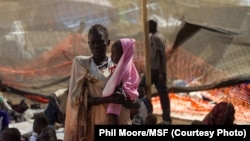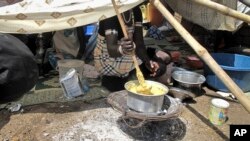JUBA —
Tens of thousands of South Sudanese under the age of five could die this year and nearly a quarter of a million children will suffer severe acute malnutrition unless food and medical aid are stepped up immediately, the United Nations Children's Fund (UNICEF) warned Friday.
"Many children in South Sudan already faced emergency levels of under-nutrition in the two and a half years since independence in 2011," UNICEF said in a statement.
"Now the on-going conflict has pushed them to the edge – unless treatment is scaled up immediately. Up to 50,000 children under the age of five are likely to die," UNICEF declared.
UNICEF spokeswoman Doune Porter said children who have been forced from their homes by four months of fighting face the greatest risk of severe acute malnutrition. Many have already resorted to eating what UNICEF and other aid agencies call "famine foods" -- wild roots, bulbs, grasses and berries. The onset of the rainy season will only make things worse, Porter said.
"Diarrheal diseases are likely to increase. That makes children more vulnerable to malnutrition, because they are not absorbing what they are able to eat,” she said.
The UN has reached more than 500,000 people with emergency food assistance, but officials estimate as many as 3.7 million people face severe food insecurity and need aid.
Porter said the on-going fighting has destroyed infrastructure around the country, including an estimated one-third of South Sudan's 336 malnutrition treatment centers.
"Health care services have been enormously disrupted by the conflict. Many families, many children have little - or in many cases - no access to health care services," she said.
UNICEF representative in South Sudan Jonathan Veitch warned that if the four-month-old conflict continues, farmers will miss the planting season and "we will see child malnutrition on a scale never before experienced here.”
Porter said UNICEF and its partners are sending emergency teams to some of the country’s more remote areas to try to pre-position food and provide treatment for malnutrition.
They have already reached three counties in the country’s northeast and will try to get to three more areas this month, she said, adding that it is unlikely they will be able to reach everyone.
Dr. Lul Riek, the international health coordinator at the South Sudan Ministry of Health, acknowledged that many health care facilities have been destroyed in the fighting and medical workers have fled. That means it "has become a big challenge" to provide care for the people, including South Sudan's children.
Riek said the only clear solution to the health and crises would be for both sides to immediately stop fighting.
"Many children in South Sudan already faced emergency levels of under-nutrition in the two and a half years since independence in 2011," UNICEF said in a statement.
"Now the on-going conflict has pushed them to the edge – unless treatment is scaled up immediately. Up to 50,000 children under the age of five are likely to die," UNICEF declared.
UNICEF spokeswoman Doune Porter said children who have been forced from their homes by four months of fighting face the greatest risk of severe acute malnutrition. Many have already resorted to eating what UNICEF and other aid agencies call "famine foods" -- wild roots, bulbs, grasses and berries. The onset of the rainy season will only make things worse, Porter said.
"Diarrheal diseases are likely to increase. That makes children more vulnerable to malnutrition, because they are not absorbing what they are able to eat,” she said.
Unless treatment is scaled up immediately, up to 50,000 children under the age of five are likely to die.UNICEF
Porter said the on-going fighting has destroyed infrastructure around the country, including an estimated one-third of South Sudan's 336 malnutrition treatment centers.
"Health care services have been enormously disrupted by the conflict. Many families, many children have little - or in many cases - no access to health care services," she said.
UNICEF representative in South Sudan Jonathan Veitch warned that if the four-month-old conflict continues, farmers will miss the planting season and "we will see child malnutrition on a scale never before experienced here.”
Porter said UNICEF and its partners are sending emergency teams to some of the country’s more remote areas to try to pre-position food and provide treatment for malnutrition.
They have already reached three counties in the country’s northeast and will try to get to three more areas this month, she said, adding that it is unlikely they will be able to reach everyone.
Dr. Lul Riek, the international health coordinator at the South Sudan Ministry of Health, acknowledged that many health care facilities have been destroyed in the fighting and medical workers have fled. That means it "has become a big challenge" to provide care for the people, including South Sudan's children.
Riek said the only clear solution to the health and crises would be for both sides to immediately stop fighting.





